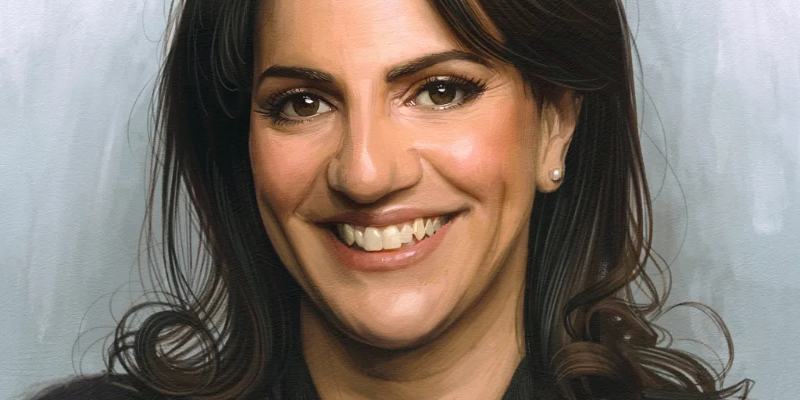
Taffy Brodesser-Akner on Falling in Love With Life
This Week on the Talk Easy Podcast with Sam Fragoso
Illustration by Krishna Bala Shenoi.
Talk Easy with Sam Fragoso is a weekly series of intimate conversations with artists, authors, and politicians. It’s a podcast where people sound like people. New episodes air every Sunday, distributed by Pushkin Industries.
*
Taffy Brodesser-Akner is a staff writer at The New York Times, where she covers everything from The Eras Tour to Tom Hanks.
She joins us today to unpack her new book Long Island Compromise, its central questions about wealth, trauma, and inheritance, and the real-life crime that inspired the story. Then, we dive into the process of writing a novel, a formative passage from the book, and Brodesser-Akner’s memories of growing up in between Brooklyn and Long Island.
On the back-half, she describes her work as a journalist, profiling Nicki Minaj and Bradley Cooper, how those experiences propelled her to write Fleishman Is in Trouble, her reflections while writing about Taylor Swift, and the transformative power of storytelling.
Subscribe and download the episode, wherever you get your podcasts!
From the episode:
Sam Fragoso: Those who come from money are at the heart and center of this new book, Long Island Compromise. Questions around survival and safety are interrogated a lot throughout the book. I want to go to the end of chapter one, when Carl Fletcher has been returned safely after being kidnapped, and the family believes they are now going to move on.
Taffy Brodesser-Akner: So, he gets returned home after four days, and his mother says to him, “Don’t let it in. This happened to your body, this didn’t happen to you. Pull it together.” And they move on; or they think that they move on. The book had started with the question, do you want to hear a story with a terrible ending? At the end of the kidnapping in the first chapter, when it’s resolved, the answer is this:
Now, obviously, this isn’t a terrible ending; this was the best possible ending to a horrific story. But life wasn’t over yet, and part of what happened next had to do with the way the Fletchers believed that they had done their time—that actually it was all that they’d been through already that had blessed them to enjoy this eternal sunny day. That the safety and survival they delighted in was earned by them, a sort of hazard pay for what they had endured. Carl Fletcher had been kidnapped and not only did this kidnapping not ruin his family; no, the kidnapping became a symbol of the family’s fortitude, of their ability to survive in the world. The Fletchers persisted, a beacon of what a person should hope for their family, arm in arm in lockstep down the pathways of happiness and prosperity.
The problem is that they didn’t stop to consider what the rest of us knew, which was that they had no right to set the conditions for safety and survival in the first place—that safety and survival might not work that way. They don’t care about you. They don’t accrue like an Israel bond. The more you bank on them as investments that feed off themselves, the more precarious and insidious their yields.
But what are you going to do? That’s how rich people are.
SF: “What the rest of us knew,” is what I’ve been holding onto since I read it because it seems that line was born out of a lived experience for you, starting from a young age.
TBA: It was. There’s this idea my grandmother gave me that if everyone threw their problems into the middle of the room, you would take your own if given the opportunity to take someone else’s.
SF: Would you, upon seeing everyone else’s, go, “I’ll take my own Taffy bullshit”?
TBA: I think that is the journey of the book. The journey of the book is to understand two things, which is that you fall in love, in a way, with the way your life worked out, no matter what happened.
SF: What do you mean by that?
TBA: I mean that, there are terrible things that happen in life. You work your hardest to get over them. But working hard at getting over them is also called the rest of your life, and you find yourself, years later, unable to extricate the bad from everything good that happened. And you fall in love with the entire thing. I think that’s the first thing, and the second thing is, if you have to watch people be rich in front of you, it is hard to remember that. It is hard to ever think that it is worthy to have your own problems.
Talk Easy
Talk Easy with Sam Fragoso is a weekly series of intimate conversations with artists, authors, and politicians. It’s a podcast where people sound like people. New episodes air every Sunday, distributed by Pushkin Industries.



















